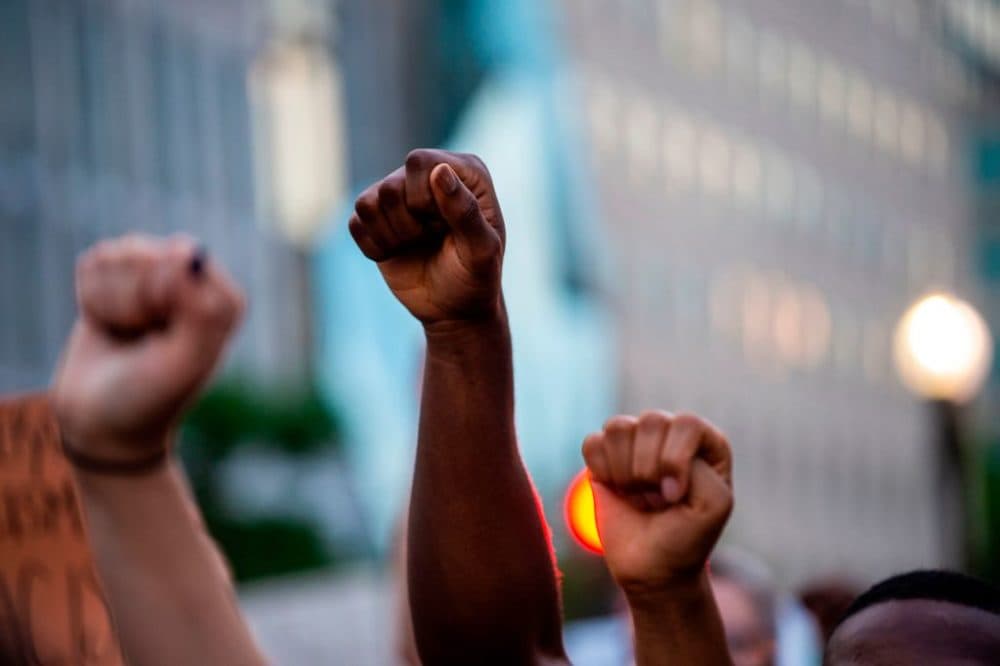Advertisement
Understand Systems Of Oppression By Interrogating Whiteness, Poet Claudia Rankine Says
Resume
Thousands of people around the world are protesting against racism, police brutality and the death of George Floyd at the hands of police.
One scholar argues to fully understand the way systems of oppression work, we must examine the construction of whiteness and what it means to be white in America.
Claudia Rankine, an award-winning author and professor of poetry at Yale University, teaches a course called “Constructions of Whiteness,” where students learn about understanding whiteness in American life and culture.
Drawing from earlier movements and influences such as Toni Morrison’s “Playing in the Dark,” she reframes the conversation to include everyone in the room.
“You had white people saying they wanted to talk about race, but they only talked about people of color or blackness,” she says. “They didn't understand whiteness as its own construction, leading to the treatment of black people or people of color.”
Racism must be redrafted not as a black community issue — but as an American problem, Rankine says.
Racism is “all our problems at this point,” she says, meaning everyone needs to reflect on the ways in which they are silent or complicit in perpetuating racial injustice.
We live in “a democracy,” she says, “and if what we want is a democracy, then it's all our problem.”
Interview Highlights
On the limits of white sympathy
“I admire the desire to wish to understand. But I think one can also understand that there is no understanding what it means to have generations of trauma and to have to sustain that and to know that at any moment you could be killed in the way that George Floyd was killed. But white people can understand that they cannot be me and still understand that there is a problem.”
On cultivating educational cross-race conversations, which has historically put the burden on black people to teach white people about racism
“Well, you know, I think we all need to be educated. I really believe that unless we start talking to each other and staying in the room and sustaining the conversation, we'll never get beyond it. And that kind of work has begun. I think what we saw and are seeing in protests are not just random people going out into the street.
“Black Lives Matter formed, Say Her Name, Kimberlé Crenshaw, and SURJ — Showing Up For Racial Justice — they have been working with other grassroots organizations to educate people, to begin conversations, to begin cross-race conversations. And now we see people able to mobilize and come out and have those conversations. So I think this is a collaborative discussion over years that has been going on. And it has to be because if it's not, we will just have the continuation of a white supremacist orientation that is unfortunately right now the governing power base in this country.”
On interrogating whiteness
“Well, you know, teaching it or even just having conversations with your neighbor, your friends, it's difficult. We all are projecting on to things in terms of what we want as our expected outcomes. All of that is happening all the time, and yet we can't not have the conversation.
“I think Robin DiAngelo has talked a lot about the fragility of white people in these conversations, how they feel victimized. They see any critique of the system, any reminder of the injustice, as a personal affront rather than understanding themselves as part of a system and investing in that change. And part of the changes is looking at the truth. And so I think, you know, a lot has to happen. You have to navigate people's feelings. You have to navigate truth-telling. You have to figure out where the facts that are reliable are coming from — all of that.”
On her 2015 New York Times article saying “the condition of black life is one of mourning”
“You know, oddly, I think this is what we're seeing — a national, international response to an event that was horrific. What I was asking for is that can we see black people as people and have the same human response we would have for the death of anyone. And understand that these kinds of deaths, it's really a death inside America. It's the death of America. It's a death of democracy. I actually feel both sad and hopeful by what I'm seeing now.”
On reframing racism as an American problem
“Another way to look at it is COVID-19. The minute we learn that people with underlying conditions were more subject to the virus and that white people were not as vulnerable as black African Americans, people wanted to throw out their masks because what happens to African Americans doesn't matter in their world view of what it means to live relationally as an American citizen. And so, you know, the same thing was happening in terms of racists. Racism, they didn't really feel like it had to do with them, which was, of course, ridiculous, because racism doesn't exist in a vacuum. It's about how this country exists and who we vote in and who controls how our government works, which is why this is probably one of the most important elections we will have ever.”
Cristina Kim produced this story and edited it for broadcast with Peter O'Dowd. Serena McMahon adapted it for the web.
This segment aired on June 4, 2020.
